Civil Rights, Death Penalty, Human Rights, Prison Industry
Podcast: Play in new window | Download
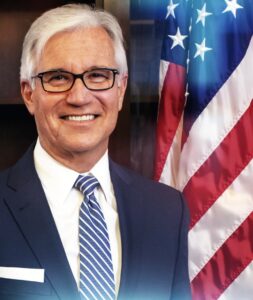
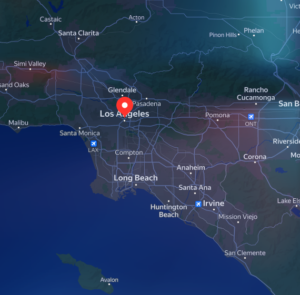
The California Criminal Legal System Reconsideration
In recent years, District Attorneys around the country in Los Angeles, Philadelphia, San Francisco, and elsewhere have broken the law and order mold as they look for better ways to address public safety, crime, prosecution, and sentencing in America, including a wholesale reconsideration of the death penalty.
To examine the criminal legal system in the United States, we’ve invited one of the leading progressive prosecutors in America, George Gascon, the District Attorney of Los Angeles County, to join us.
Guest – Attorney George Gascon began his career in law enforcement at the Los Angeles Police Department where he worked his way up the ranks from patrol officer to Assistant Chief of Police, overseeing operations for the more than 9,000 LAPD officers Then, in 2006, he was tapped to be Chief of Police in Mesa, Arizona, where he stood up to the hateful and anti-immigrant policies of then-Maricopa County Sheriff Joe Arpaio. In 2009, then-Mayor Gavin Newsom appointed Gascón to be San Francisco’s Chief of Police. Two years later, Newsom again turned to Gascón to fill a vacancy created when then-District Attorney Kamala Harris was elected California Attorney General. Gascón was re-elected San Francisco District Attorney twice.
He was the first Latino to hold that office, and the nation’s first Police Chief to become District Attorney. On December 7, 2020, he took office as the DA of LA County. He is also a former board member of the Council of State Governments Justice Center, a graduate of the FBI’s National Executive Institute and a former member of the Harvard University Kennedy School of Government’s Executive Session on Policing and Public Safety.
—-
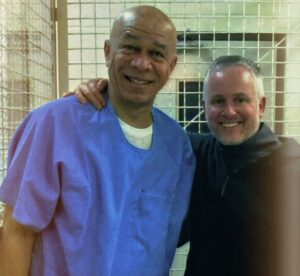

Maintaining Innocence Under Threat Of Execution: Bill Clark
We may be witnessing the dying days of the death penalty in the United States. 23 states have ended the use of capital punishment, while it remains on the books in 27 states, yet the number of executions are in decline. The U.S. public sector and political leaders are beginning to understand what abolitionists have always known: The death penalty is a relic of our racist past yet discrimination on the basis of race continues to plague the system. 55.8 percent of those executed are white, but 33.9 percent are Black and 8.4 percent are Latino/a, which is gruesomely out of proportion to the national population. Currently, 42 percent of death row inmates are white but a shameful 41 percent are Black.
Today, on Law and Disorder we are focusing on the state of California, where there are 650 inmates on death row, the largest number in the Western Hemisphere. 13 men have been executed since 1978. The last execution was in 2006. Due to a combination of court rulings and a moratorium imposed by Gov Gavin Newsom in 2019, there have been no executions in California in the last 18 years. Five inmates have been officially found innocent, all of whom were people of color. They join the 200 exonorees nationwide. Despite the moratorium in California, 17 people have still been sentenced to death in California — 80% of whom are Black or Latino.
The California Supreme Court is currently deciding whether to take up a historic petition filed in April by a coalition of civil rights and justice organizations arguing that racial discrimination in the administration of the death penalty in California violates the equal protection guarantee of the state constitution. The petition to the state Supreme Court cites more than a dozen studies showing race discrimination. One looked at more than 55,000 homicide cases in California between 1979 and 2018 and found that Black individuals were more than twice as likely to receive a death sentence as white individuals, while Hispanic individuals were 1.5 times more likely to receive a death sentence. California Attorney General Rob Bonta agreed in his response to the petition that the evidence of racial discrimination in capital punishment is “profoundly disturbing.”
So those are some of the facts which describe the capital punishment system in California and the Nation. But today on Law and Disorder we want to go beyond those raw statistics and take a look at the human cost of the death penalty by talking to someone who has been living under the threat of execution for 33 years. Bill Clark’s Film Project
Guest – Bill Clark joins us by phone from prison in Vacaville, California, where he has been housed since March of this year after his transfer from San Quentin, where he was incarcerated for 26 years. I have known Bill for 24 years. Despite his situation, he is a hopeful, resilient and creative person. He was convicted of two murders in the early 1990s and has steadfastly maintained his innocence as he continues to challenge his convictions and death sentences.

————————————
Civil Liberties, Civil Rights, Death Penalty, Human Rights, Prison Industry, Violations of U.S. and International Law
Podcast: Play in new window | Download
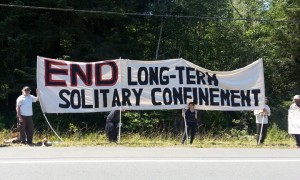
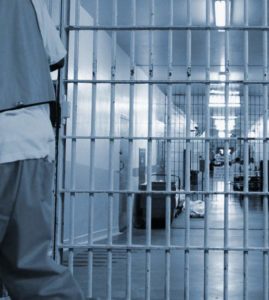
CCR And Others Issue Complaint Against U.S. Death By Incarceration
The United States condemns one out of every seven prisoners–or more than 200,000 people– to die in prison, over two-thirds of them people of color. “Death by Incarceration,” or DBI, includes extreme sentences such as life, and life without possibility of parole. DBI violates two treaties the U.S. has ratified, the Convention Against Torture and the Race Convention. DBI “is the devasting consequence of a cruel and racially discriminatory criminal legal system that is designed not to address harm, violence, and its root causes, but to satisfy the political pressure to be tough on crime,” according to a complaint filed with UN special rapporteurs on September 15.
Valerie Kiebala helped bring together organizations including the Center for Constitutional Rights, the Drop LWOP Coalition, and the Abolitionist Law Center, to file the 31-page complaint.
Related Article: Human Rights Groups Urge UN to Call for Abolition of Death by Incarceration by Marjorie Cohn.
Guest – Valerie Kiebala is a writer, organizer, and artist. She is the communications director for Straight Ahead, a nonprofit lobbying organization fighting for the human rights and liberation of incarcerated people. Valerie previously worked as an editorial manager and staff writer for Solitary Watch, a nonprofit organization documenting and exposing the use of solitary confinement across the U.S. Her work has appeared in the Root, the Appeal, Truthout, the Chicago Reporter, and Shadowproof.
—-

Fog Data Science: Constant Surveillance
Each time we access the internet, we open the door for companies to track our behavior and our location. This information is gathered and sold by data brokers, but not just for the purpose of helping marketers send us targeted ads. Our movement data is also marketed to law enforcement agencies around the nation. State sheriffs, highway patrol, and local police now can trace millions of Americans’ everyday movements dating back several years. One Virginia data broker contracts to sell telephone geolocation data to state and local law enforcement, according to an investigation by the Electronic Frontier Foundation, or EFF.
EFF Staff Technologist Bennett Cyphers led the investigation. He and his team found that Fog Data Science sells access to a database with information about where a person was at any point in time over the past several years. The surveillance isn’t limited to possible crime scenes. It includes homes, churches, workplaces, health clinics—places in which we have constitutionally-protected expectations of privacy.
Guest – Bennett Cyphers is a staff technologist on EFF’s Tech Projects team. He focuses on consumer privacy, competition, and state legislation. He also assists with development of Privacy Badger, a browser add-on that stops advertisers and trackers from secretly tracking your movements.
Hosted by Heidi Boghosian and Marjorie Cohn

——————————————
Civil Liberties, Civil Rights, Death Penalty, Human Rights, Prison Industry, Racist Police Violence
Podcast: Play in new window | Download
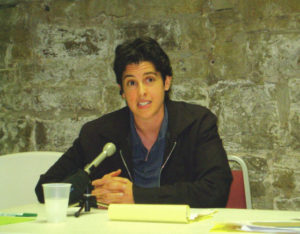

The Case Of Bernina Mata And Clemency
In 1998, Bernina Mata was convicted of first-degree murder in the killing of John Draheim, who she’d met at a local bar. After he tried to rape her, she fought back in defense and stabbed him. At trial, prosecutors portrayed Mata as a man-hating lesbian, and literally described her as a “hard core lesbian” who they claimed killed because the victim made an unwanted sexual pass at her. They claimed Mata’s sexuality was the motive and showed the jury books from her apartment—Call Me Lesbian, Homosexualities, and Best Lesbian Reading —to support their theory. Prosecutors claimed that “a normal heterosexual person would not be so offended by the (victim’s) conduct as to murder.”
The jury found Mata guilty and sentenced her to death. In 2003, her sentence was commuted from death to life in prison after former Governor George Ryan commuted the sentences of everyone on death row in that state in response to a historic organizing clemency campaign. Now, Mata’s defense team – are asking Illinois Governor J.B. Pritzker to grant her release from prison. They filed a petition for executive clemency, saying her case was plagued by racism and anti-lesbian oppression.
FreeBernina
Guests – Attorney Joey Mogul and Deana Lewis, Joey Mogul is a partner at the People’s Law Office and has represented Mata since 2002. Deana Lewis is an Associate Director at the Institute for Research on Race and Public Policy at the University of Illinois at Chicago. Deana is involved in the work of several Chicago community and national organizing collectives including Love & Protect, Just Practice Collaborative, and Survived & Punished.
—-

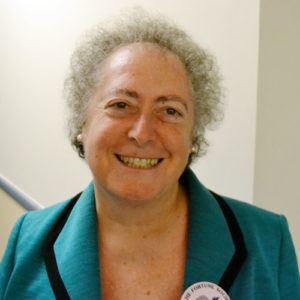
Joanne Page: The Fortune Society
Each year in the United States, more than 600,000 individuals are released from state and federal prisons. A staggering 6.9 million people are on probation, in jail, in prison, or on parole. On top of that, an additional nine million persons cycle through local jails.
As grim as these numbers are, more sobering is the fact that more than two-thirds of prisoners are rearrested within 3 years of their release. Half of those are reincarcerated.
Why is this recidivism rate so high? It has much to do with the failure of re-entry support programs. We have the world’s largest carceral state but no effective support system for people finishing their sentences and re-entering society. Consequently, crime rates soar, more individuals are victims of crime, families and communities suffer when we fail to deal with the consequences of over-incarceration. When reentry fails, the costs are high — more crime, more victims, and more pressure on already-strained state and municipal budgets. There is also more family distress and community instability. Community reintegration impacts several larger areas such as community health, education, employment, family relationships and housing.
In every aspect, failure to support recently released individuals is costly to society.
Guest – JoAnne Page is the President and CEO of the NY-based Fortune Society. Policymakers and researchers frequently cite the organization for its pioneering work. A graduate of Yale Law School, Page cultivated and created many of Fortune’s signature programs including substance abuse treatment, counseling, family services, HIV/AIDS health services, mental health programs, job training and employment services, parenting initiatives, and supportive and permanent housing. Page is a leading authority on issues including prison reform, solitary confinement, wrongful convictions, the over-incarceration of young men of color, sentencing reform, violence prevention, homeless housing, effective policing strategies, legislation, sex offender registries, and more.

————————
Civil Liberties, Death Penalty, Human Rights, Political Prisoner, Prison Industry, Supreme Court, Truth to Power
Podcast: Play in new window | Download
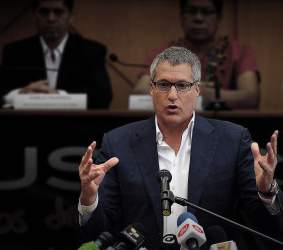
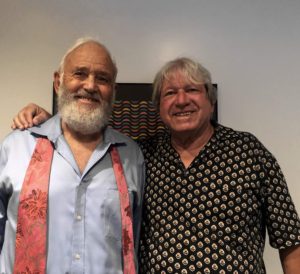
U.S. Judge Sides With Chevron, Blocks $9.5 Billion Judgement, Donziger Arrested.
In 2012 the Ecuadorian Supreme Court ordered the oil giant Chevron to pay $9.5 billion in damages to five indigenous tribes of the Amazon rain forest. It was one of the largest judgments in history.
The court ruled that Chevron systematically contaminated a patch of the Amazon forest the size of Rhode Island. The people there are suffering from cancer and other diseases and forced to drink toxic water and grow crops on poisoned land.
Chevron retaliated. They sued in federal court in the Southern District of New York, got Judge Louis Kaplan, an extremely pro corporate judge, who sided with the second largest oil company in the world, blocked the judgment from being enforced, and instead had the peoples’ attorney Steven Donziger charged with racketeering arrested, confined to his home, forced to wear an ankle bracelet, and suspended from the practice of law.
On March 4, 2019 the judge declared the judgment null and void. He said it was the fruit of an illegal shakedown, the result of “a five-year effort to extort and defraud Chevron.“ Donziger responded saying that the judge was an accomplice in “the biggest corporate retaliation campaign in history.“ He told Rolling Stone magazine that “Chevron has spent over $2 billion trying to wear us out and shut us down.”
The oil companies sole witness to its central charge of bribery was a corrupt Ecuadorian ex-judge named Alberto Guerra. They gave him $2 million, got him American citizenship, and installed him and his family in a home in the United States.
ChevronToxico.com
ChevronInEcuador.com
Guest – Attorney Martin Garbus, one of three pro bono lawyers representing Donziger in an attempt to get his law license restored.
Guest – Paul Paz y Miño, Associate Director at Amazon Watch since 2007, and a professional human rights, corporate accountability and environmental justice advocate.
—-
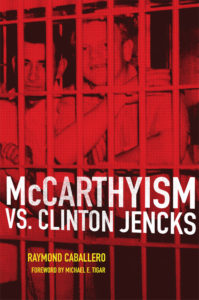
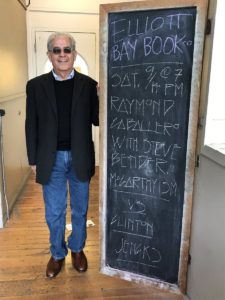
McCarthyism vs. Clinton Jencks By Raymond Caballero
Clinton Jencks was a decorated World War II hero, who in 1950 led a local of the International Union of Mine, Mill, and Smelter Workers in the famed Empire Zinc strike. It was memorialized in the blacklisted 1954 film Salt of the Earth—in which wives and mothers replaced strikers on the picket line after an injunction barred the miners themselves. Jencks was also a target of Senator Joe McCarthy’s anticommunist hysteria in which thousands lost their jobs, careers and reputations, even though none had committed a crime. Three years after the strike, Jencks was arrested and charged with falsely denying that he was a Communist. He was sentenced to five years in prison.
The Supreme Court in Jencks v. United States (1957), overturned his conviction in a landmark decision that mandated providing an accused person any previously hidden witness statements so that cross-examinations could be effective. In the new book McCarthyism vs. Clinton Jencks, scholar Raymond Caballero reveals for the first time that the FBI and the prosecution knew all along that Clinton Jencks was innocent.
Jencks’s case typified the era, exposing the myriad of injustices many suffered at the hands of McCarthyism. His journey for justice offers a new window into the McCarthy era’s oppression, which irrevocably damaged the lives, careers, and reputations of thousands of Americans.’
Guest – Raymond Caballero, author of Orozco: The Life and Death of a Mexican Revolutionary. Human rights attorney Michael E. Tigar wrote the introduction to McCarthyism vs. Clinton Jencks.
————————-

————————-
Civil Liberties, Death Penalty, Human Rights, Political Prisoner, Supreme Court, Truth to Power, War Resister
Podcast: Play in new window | Download
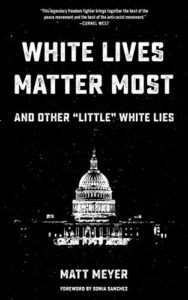
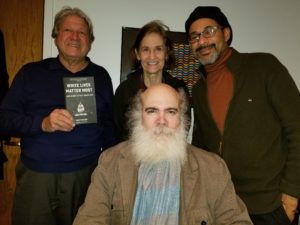
White Lives Matter Most And Other “Little” White Lies
In a society in which entrenched racism persists, is it possible for white activists to meaningfully engage in anti-racist movements such as the movement for black lives?
Longtime peace activist, educator and author Matt Meyer examines that question in his new book White Lives Matter Most And Other “Little” White Lies. As we honor the life and legacy of Reverend Dr. Martin Luther King Jr. we talk with Matt Meyer of whom Cornell West says “this legendary freedom fighter brings together the best of the peace movement and the best of the anti-racism movement. “
Guest – Matt Meyer is the International Peace Research Association representative at the United Nations, the national co-chair of the Fellowship of Reconciliation, and the War Resisters’ International Africa Support Network Coordinator. A noted educator, author, and organizer, Meyer focuses on an extensive range of human rights issues including support for political prisoners; solidarity with Puerto Rico, the Black Liberation movement and all decolonization movements; and bringing an end to patriarchy, militarism, and imperialism.
—-
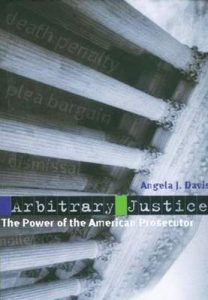
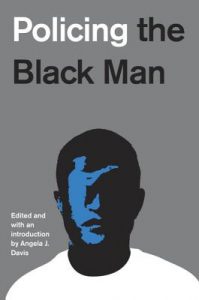
Attorney Angela Davis: Arbitrary Justice
“In the halls of justice”, it has been quipped, “the only justice you find is in the halls.” H. Rap Brown, a leader of SNCC, the Student Non-violent Coordinating Committee, said that justice in America means “just us”. There are 2.3 million people in American prisons today. A great proportion of them are African-Americans. If you assume Europe has the same social situation that we do in America, it is a telling fact that we have seven times as many prisoners. Part of the explanation for this phenomenon, In addition to the racist nature of the United States of America, is the power that the American prosecutor has. It is the power to choose whom to prosecute and for what crime. It is the power to obtain convictions, not to seek justice. It is a power that is discretionary and open to abuse. This abuse is rarely reviewable or punished.
Guest – Attorney and Professor Angela J. Davis author of Arbitrary Justice: The Power of the American Prosecutor. Her most recent book “Policing the Black Man” covers the key issues of the Black Lives Matter movement. Angela J. Davis, professor of law at American University Washington College of Law, is an expert in criminal law and procedure with a specific focus on prosecutorial power and racism in the criminal justice system. Davis previously served as director of the D.C. Public Defender Service, where she began as a staff attorney representing indigent juveniles and adults. She also served as executive director of the National Rainbow Coalition and is a former law clerk of the Honorable Theodore R. Newman, the former Chief Judge of the D.C. Court of Appeals. Davis is the author of Arbitrary Justice: The Power of the American Prosecutor
———

———
CIA Sponsored Terror, Civil Liberties, Death Penalty, Guantanamo, Habeas Corpus, Human Rights, Iraq War, Prosecution of the Bush Administration, Targeting Muslims, Torture, Truth to Power, War Resister
Podcast: Play in new window | Download
Updates:
- Hosts Discuss the Recent Film – Vice
—-
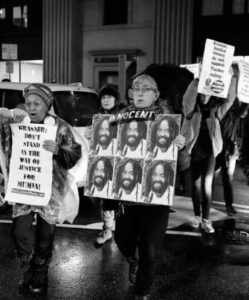
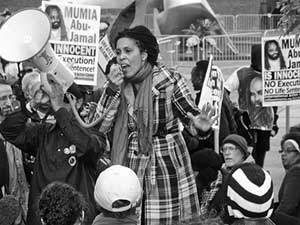
Philadelphia Judge Rules Mumia Abu-Jamal Can Reargue Case
We are pleased to begin the new year with a major development that might pave the way to freedom for former Black Panther Mumia Abu-Jamal, the award-winning journalist convicted in the 1981 murder of Philadelphia police officer Daniel Faulkner.
In late December, a Philadelphia Common Pleas Court judge ruled that Mumia can reargue his appeal in the case before the Pennsylvania Supreme Court. The decision hinges on a recent Supreme Court Decision with similar facts. Then presiding Chief Justice Ronald Castille failed to excuse himself due to his prior role as Philadelphia district attorney in Mumia’s earlier appeal. Mumia’s attorneys argued that Castille made statements related to persons accused of killing police officers that indicated he should have recused himself. His campaign speeches and letters urged capital punishment in police-killing cases.
As we’ve long reported, Mumia spent nearly three decades on death row before his sentence was thrown out over flawed jury instructions. In 2001, prosecutors agreed to a sentence of life without parole.
Judge Leon Tucker’s decision this past December was split; he denied Mumia’s claim that Castille had, “personal significant involvement” in the case while in the DA’s Office.
Guest – Professor Johanna Fernandez, is a native New Yorker. She received a PhD in History from Columbia University and a BA in Literature and American Civilization from Brown University. Professor Fernández teaches 20th Century U.S. History, the history of social movements, the political economy of American cities, and African-American history. She has previously taught at Carnegie Mellon University in Pittsburg, PA and Trinity College in Hartford, CT and is, most recently, the recipient of a Fulbright Scholars grant to the Middle East and North Africa that will take her to Jordan in spring 2011, where she will teach graduate courses in American History. She is with the Campaign to Bring Mumia Home.
—-
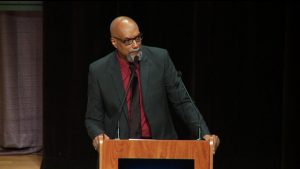

Anti-War Movement Gains Traction Amid Perpetual War
American wars undertaken in the Middle East have been raging for an historically unprecedented 17 years, ever since the attack on the World Trade Center and the Pentagon on September 11, 2001.
President George W. Bush understood that being at war president would boost his sagging popularity. First, he ordered the attack on Afghanistan on the pretext that it harbored Osama bin Laden and would not give him up.
Then, in 2003, with designs on Iraq’s oil, the United States of America unleashed an illegal war on that country. It was falsely claimed that Iraq had weapons of mass destruction and ties with Al Qaeda. The war involved the bombing of cities and was supposed to be of short duration. Americans were advised that the Iraqi people would welcome the American intervention. Their president Saddam Hussein was captured and executed. Hundreds of thousands of people were killed and hundreds of thousands we’re made refugees.
The entire Middle East was destabilized as the wars spread under the Obama administration. His secretary of state Hillary Clinton planned the aggression against Libya, where its leader Mohamar Qudaffi was captured and bayoneted to death. The country was destroyed. Clinton said at the time “we came, we saw, he died.“
The war was extended Syria, which the United States had coveted since World War II. The United States and Israel failed to kill its leader Bashar Assad but reduced much of the country to ruins and created thousands of refugees Then the United States militarily backed and supplied its Allie Saudi Arabia in its war in Yemen where 85,000 children have died of starvation.
All in all the United States made war on seven middle eastern countries simultaneously. Then, recently, fulfilling a campaign promise, President Donald Trump, the commander-in-chief, ordered the withdrawal of troops from Afghanistan and Syria. He has been opposed in this by the entire establishment, the military, the media, the intelligence agencies, and both the Republican and Democratic parties.
Guest – Ajamu Baraka, an initiator and leader of the Black Alliance for Peace, an organization which is part of the coalition. He has also just returned from a meeting of international leaders because the USA’s involvement of a possible overthrow of the government of Venezuela. Ajamu Baraka helped organize a conference in Baltimore Last month concerning USA’s 800 bases abroad particularly the new ones in Africa.
























